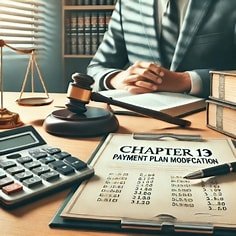
Is It Too Late to File Bankruptcy After a Judgment? Insights from Berning Law, LLC
Is It Too Late to File Bankruptcy After a Judgment? Insights from Berning Law, LLC
When facing a financial crisis, many individuals find themselves grappling with the decision to file for bankruptcy. One common concern is whether it’s too late to file for bankruptcy after a judgment has been entered against them. At Berning Law, LLC in Milwaukee, we often encounter clients who are unsure of their options post-judgment. This article aims to clarify whether filing for bankruptcy remains a viable solution in such scenarios, focusing on Chapter 7 and Chapter 13 bankruptcies. Additionally, we’ll explore Wisconsin Chapter 128, a little-known non-bankruptcy tool that can also provide financial relief.
Understanding the Judgment and Its Implications
A judgment is a court order that establishes the amount of debt you owe to a creditor. Once a judgment is entered, creditors can take additional steps to collect the debt, such as wage garnishment, bank account levies, or placing liens on your property. The stress and financial burden of these collection actions can be overwhelming, making bankruptcy an attractive option for a fresh start.
Bankruptcy: A Fresh Start Even After Judgment
Chapter 7 Bankruptcy
Chapter 7 bankruptcy, also known as liquidation bankruptcy, allows for the discharge of most unsecured debts. Filing for Chapter 7 can halt garnishments and other collection actions through the automatic stay provision. Even if a judgment has been entered, Chapter 7 can still be filed, potentially wiping out the debt associated with the judgment.
Chapter 13 Bankruptcy
Chapter 13 bankruptcy, or reorganization bankruptcy, enables individuals to repay their debts over a three to five-year period under a court-approved plan. This type of bankruptcy can also stop garnishments and other collection efforts. Filing for Chapter 13 after a judgment can provide the debtor with the opportunity to catch up on missed payments and manage their debts more effectively.
The Automatic Stay: Immediate Relief
One of the most significant benefits of filing for bankruptcy, whether Chapter 7 or Chapter 13, is the automatic stay. This legal provision immediately stops most collection actions, including wage garnishments, once the bankruptcy petition is filed. The automatic stay provides immediate relief and a breathing space for the debtor to reorganize their financial situation.
Garnishment and Bankruptcy
If a creditor is garnishing your wages due to a judgment, filing for bankruptcy can stop the garnishment. In Chapter 7, any wages earned after the bankruptcy filing are typically protected from garnishment. In Chapter 13, a repayment plan is established, which may reduce the amount deducted from your wages and help you manage your finances better.
Wisconsin Chapter 128: A Non-Bankruptcy Alternative
While bankruptcy is a common solution, it is not the only option available to those facing financial difficulties. Wisconsin offers a unique non-bankruptcy tool known as Chapter 128. This state-specific statute provides an alternative for individuals seeking debt relief without filing for bankruptcy.
What is Wisconsin Chapter 128?
Chapter 128 is a debt amortization plan that allows individuals to repay their debts over a three-year period without the stigma or long-term consequences of bankruptcy. It is designed to help debtors manage their obligations while protecting them from further collection actions, including wage garnishments.
Benefits of Chapter 128
Avoids Bankruptcy: Filing under Chapter 128 does not constitute a bankruptcy and therefore does not impact your credit score in the same way.
Stops Garnishments: Similar to bankruptcy, filing for Chapter 128 can halt wage garnishments and other collection efforts.
Flexible Repayment Plan: Debtors can repay their debts through a structured plan managed by a court-appointed trustee.
Creditor Cooperation: Creditors are often more willing to negotiate and accept the terms of a Chapter 128 repayment plan.
How to File for Chapter 128
To file for Chapter 128, a debtor must submit a petition to the court, along with a proposed repayment plan. A trustee is then appointed to oversee the plan, ensuring that payments are made to creditors as agreed. Once the plan is approved, creditors are prohibited from taking any further collection actions against the debtor.
Timing Is Crucial
While it is possible to file for bankruptcy or opt for Chapter 128 after a judgment has been entered, timing is critical. The sooner you consult with a bankruptcy attorney or explore Chapter 128, the more options you may have available. Delaying the decision can lead to more aggressive collection actions and additional financial strain.
Consult with Berning Law, LLC
Navigating bankruptcy or a Chapter 128 filing after a judgment can be complex, but you don’t have to do it alone. At Berning Law, LLC in Milwaukee, we specialize in helping individuals understand their options and guide them through the process. Whether you are considering Chapter 7 for a fresh start, Chapter 13 for a structured repayment plan, or Chapter 128 as a non-bankruptcy alternative, our experienced attorneys can provide the support and expertise you need.
In conclusion, it is not too late to file for bankruptcy or consider Chapter 128 after a judgment has been entered. Both Chapter 7 and Chapter 13 bankruptcies, as well as Wisconsin’s Chapter 128, offer pathways to financial relief and a fresh start, even in the face of judgments and garnishments. If you are in Milwaukee and facing such financial difficulties, contact Berning Law, LLC to explore your options and take the first step toward regaining control of your financial future.


